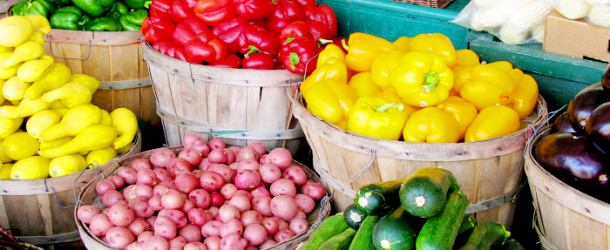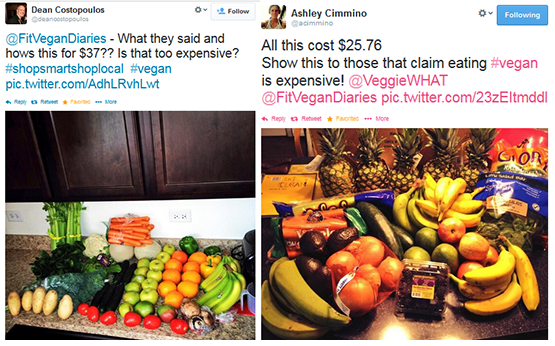It’s a common misconception that it’s too expensive to be vegan. Your meat-loving family insists their grocery bill would shoot through the roof if they dare try. Just the other day a friend of mine sent me a Facebook message asking how I kept my grocery costs down as a vegan mother of two. There’s this fictitious belief that a secret weapon lies hidden, prohibiting you from seeing and taking advantage of wonderful, nutritious, affordable food. I’m here to tell you that secret: the fruit and vegetables aren’t the problem, it’s the meat.
The produce section is the first part of the store I shop from because that’s where half my money is spent. During my recent trip I jotted down some of the prices and even I surprised myself at how cheap this food was: $1.50 per lb of apples ($2.99 for organic), $1 per cucumber, $0.67 per lb of bananas, $2.49 per head of broccoli, $1.45 per asparagus bunch, $2.43 per lb of grapes, $1.83 per lb of snow peas, $0.43 per kiwi (or $4.99 for a box), $1-$3 per large pineapple, $1.64 per lb of oranges, 3lb bag of onions for $1.86, $0.80 per lb of russet potatoes… and the list goes on! By the end my cart was filled with an array of fruits and vegetables and it added up to roughly $47. That’s a bargain!
But that’s not all. My budget allows $100 per week so I used the rest to buy a few boxes of brown rice (roughly $1.50 per box), whole wheat pasta ($0.97 per box), a few cans of beans ($0.80 per can), non-dairy milk (we prefer rice milk at $4.50 for a half gallon), non-dairy coffee creamer (So Delicious brand, roughly $3), all-natural peanut butter ($5 for 2 cans), and two loafs of whole wheat bread ($4 for two). After purchasing these amazing foods, I can’t imagine tacking on the price of meat and dairy to this already nutritionally fulfilling trip. Quite frankly, I couldn’t afford to.
So where do people get their theory that vegan is expensive? There’s a couple reasons: purchasing faux meats and cheeses, processed foods, TV dinners, and buying foods they think they should be eating and not what they actually would enjoy (or eat). However, the big ingredient to this myth is being uninformed. In today’s society, vegan diets — or more importantly, plant-based diets — are the minority when you look at our eating habits as a whole. It takes a bit of time and priority to really benefit from what a well-balanced vegan diet has to offer. Not to mention you’re saving ten fold by preventing a plethora of food-related illnesses such as heart disease, diabetes, high blood pressure, high cholesterol, high triglyceride levels… the list goes on. That’s why it’s crucial to invest in your health with food rather than the healthcare system.
So what are some great tips for making a vegan diet affordable? Here’s what I suggest:
- Don’t feel you have to buy organic when it comes to produce. If you have the cash, great! But there’s no all-or-nothing approach when it comes to buying nutritious food
- Buy in bulk. If you have a local wholesales, utilize their bulk prices for the good of your budget. You’ll spent less than if you bought in small increments every week
- Take advantage of your local farmer’s markets and co-ops. These businesses exist to give you the best products at the cheapest prices. Some even deliver produce right to your door at prices cheaper than your grocery store
- Get informed. Look up vegan recipes to try and familiarize yourself with typical vegan ingredients and entrees. It’s just like learning to drive a car – it’s unfamiliar at first but you’ll be a pro in no time
- Lay off the animal-free meats and cheeses. If you’re transitioning into vegan, it’s okay to indulge in these tasty alternatives but they can be pricey. If this extra expense isn’t in your budget, it’s best to avoid it all together and indulge in cheaper, healthier stuff
- Drink water. This seems like a no brainer but purchasing juices, sodas, and even non-dairy milks can add up. I only purchase one container of non-dairy milk to accompany my children’s breakfast, otherwise we drink water for the rest of the day.
What other budget-saving tips do you have for vegan living?
Featured image courtesy of Creative Commons



Good article. It always bothers me when people use veganism being “too expensive” as one of their many excuses as to why they wouldn’t think of trying it. I always ask them what kind of meat and dairy they buy if it’s cheaper for them to buy that than fruits, grains, and vegetables. I mean, maybe Velveeta and Ball Park hot dogs are cheep, but who wants to eat that?
Frankly, my grocery bills have always been higher than average. I cook delicious, interesting meals, which lends to buying more of a variety of ingredients than some. Also, I don’t compromise when it comes to organic, fair trade, etc., unless I absolutely have to. So, it costs a little more. But it costs me less to be vegan than it did when I ate animals.
Oh, it should also be pointed out that faux-leather is ALWAYS cheaper than real leather. Just another bonus of living compassionately.
Bravo! A much needed awareness write-up to squash the myth that veganism is expensive, more than eating an animal-based diet! Viva Veganism!
Fully agree with Screwdestiny! Live compassionately and healthily!
Eating vegan is much more cost effective than eating a meat based diet as long as one eats whole foods and not all the vegan processed junk food.
I would like to add though that if one is eating lots of vegetables, it is really important to learn about the dirty dozen from the environmental working group or EWG.org to learn which vegetables are highly contaminated with pesticides which have penetrated into the body of the produce and can’t be washed off. You’ll save money on groceries, but reduce the risks of feeding your children all the endocrine disruptors which are in the pesticides. Strawberries, apples, peaches, bell peppers, all leafy greens and potatoes should be organic. An even cheaper way to eat beans is to buy them dried, soak overnight and throw them in a slow cooker with 2 bay leaves. U’ll get the equivlent of 3 cans of beans for the price of 1, but most importantly you won’t be getting any leaching of Bisphenol A (BPA) from the lining of the cans.
Hope this info helps. Namaste
I agree with Debbie that knowing the Dirty Dozen and Clean 15 (or printing a wallet-sized version to carry with you) is important.
I’m a whole-foods, organic, from scratch vegan, and have been for three decades or so (I was vegetarian before that). I’m also an avid Greenmarket shopper, and eat with an attitude of gratitude: before I take the first bite, I thank everyone and everything that helped get the food to my plate. I express my gratitude to local growers in several ways: I always thank them, often let them keep the change (when it’s just a coin or two), and when I create something really special using their produce, I like to bring a small portion with me on my next trip, so they can sample it.
To be a successful, lifelong vegan requires learning about nutrition, and judicious use of food-based supplements. I sprout my pulses (beans and lentils) and either eat the sprouts, or cook them after sprouting. I also soak and rinse nuts and seeds. I don’t eat food from cans unless I have no choice.
Friends who have shopped with me say, “Zyxomma, you spend so much money on food!” My answer is always the same: apart from dental cleanings, my medical bills total ZERO. Health and peace.